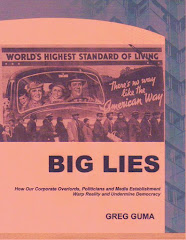Tunisia, Bahrain, Yemen, Syria, Egypt and even Saudi Arabia. All have seen protests and government repression in recent days. But not one of them has been attacked by the US, France or Britain and none of their “rebels” are receiving military, financial, or moral support from Western powers.*** Also keep in mind: Libya’s rebels are a bit like some of Kosovo’s rebels — a mixed bag. Freedom fighters, not so much.
So why is Libya the only target of “humanitarian” intervention? Gaddafi, right? Over the years we’ve heard a stream of horror stories and strange tales: He takes various drugs, he’s Hefner in a tent, a bisexual, or maybe a cross-dresser, who cuddles with a teddy bear and has epileptic seizures. Some of it might be true, but none of it provides a reason to bomb.
They also say he would “kill his own people." Duh. That's what happens in civil wars. Lincoln killed his own people.
What we know for sure is that Libya has provided its citizens with a higher standard of living than most of Africa. The 2010 UN Human Development Index, a measure of health, education and income, ranked Libya first on the continent. Until this year, no other country in the region had a more secular government, or a better human-rights record. In Egypt almost a 1000 people were killed during the recent uprising. Police shot them with live ammunition. Similar stories have been reported in Syria, Yemen and elsewhere this Arab Spring.
According to Fox News, as the UN rushed to condemn Gaddafi for attacking protesters in late February, its Human Rights Council was about to adopt a report “chock-full of praise for Libya's human rights record." They lauded Libya for improving education, making human rights a ‘priority’ and upgrading its ‘constitutional’ framework. Several countries, including Iran, Venezuela, Saudi Arabia but also Canada, give Libya positive marks for the legal protections afforded to its citizens — who are now revolting against the regime and facing bloody reprisal." Again, that’s Fox News reporting.
In the past Libya has been charged with involvement in an attempt to blow up the US Embassy in Cairo, various hijackings, an explosion on a US plane over Greece, blowing up a French airliner over Africa, a synagogue in Istanbul, and a disco in Berlin. The last of those killed US soldiers. In 1990, when the US needed a country to blame for bombing PanAm flight 103 over Lockerbie in Scotland, Libya was the easy choice. But ultimately not to blame.
Gaddafi has been a handy enemy for the US longer than anyone living except Fidel Castro. Reagan dubbed him the "mad dog of the Middle East." That's why he's called the Great Communicator. But the demonizing started shortly after he took power. His initial crime wasn't the coup, it was closing down a US air force base. Of course, he subsequently supported what he regarded as revolutionary groups and was accused of using his oil revenues to support various radical, sometimes terrorist organizations, particularly Palestinian and Muslim dissident movements. He backed the IRA and separatists in Europe, groups struggling against apartheid in South Africa, opposition groups in Latin America, the Japanese Red Army, the Red Brigades, and the Baader-Meinhof gang.
Still, Gaddafi's real crime isn’t his support for terrorists and/or freedom fighters, but rather backing the wrong ones, from the US point of view. He didn’t back the Nicaraguan Contras, UNITA in Angola, Cuban exiles in Miami, and the governments of El Salvador and Guatemala – all beneficiaries of generous US backing. There was just one band of “freedom fighters” that both Gaddafi and Reagan supported – bin Laden’s old group, the Moujahedeen in Afghanistan. Twisted minds evidently think alike.
Gaddafi has often been a vocal critic of US foreign policy, playing the role of an anti-Zionist pan-Africanist leader. Plus, he called his regime socialist, clearly too much for the US to endure. When protests erupted in Tunisia and Egypt – even though Gaddafi had been rehabilitated during the Bush II era and became an ally in the war on al-Qaeda – US spooks just couldn’t resist spurring on dissidents in a country strategically located between them. Beneath the media radar, the CIA has likely been supplying Libya's rebels with arms, money, and advisors for more than a few weeks.
What does the US get if the big guy goes? Well, ask yourself what other African country would accept a US military base? There's only one at the moment, in Djibouti. But foreign policy scholar Phyllis Bennis predicts that another may pop up in Libya after the dust settles, probably near some oil wells. Or maybe Libyans will get a choice — between a US and a NATO base.
There is another option: The US could admit that Gaddafi isn’t a real threat – except maybe in a fashion sense – just another eccentric dictator with bad taste and a crush on Condoleezza Rice.
Maybe we should make him a judge on American Idol. Or start a new series, Strongmen, in which exiled dictators compete to see who will get a political makeover. Trump could host.
VENGEANCE AS POLICY
Bin Laden's death could be a moment to replace vengeance with justice. But not so far. Too many people have died for anyone to claim, as President Obama's did last week, that "justice has been done." However you calculate when this so-called war actually began, the US government chose how to respond to 9/11. From the start it chose vengeance.
Then, last week American justice was officially redefined – as summary execution with two bullets in the head. When did foreign policy become like the Judge Dredd comic?
We’ve played into Osama’s hands. He wanted to bankrupt the US by getting it to overreact and overspend. Mission accomplished. He also knew that the best tactic for a weaker opponent is to use the weapons of the powerful against them. They can also gain an advantage if their enemies believe that they’ve won the war when they’ve actually only won a battle.
Holy war, martyrdom, arrogance, economic waste – these are some of the weapons the weak use against empires. And in this clash the preeminent weapon has long been martyrdom. Bin Laden certainly didn't want to end up like Saddam Hussein, a hunted animal trapped a hidey hole, put on public trial and ritually executed. He wasn’t the type to go down like Al Capone, captured and jailed on a technicality. He wanted out in an explosion or blaze of gunfire. We’re told that he wasn’t armed but somehow resisted. However it happened, the Osama myth got another assist from his enemies.
But his greatest coup was to get the US and its allies to spend enormous amounts of money – literally trillions of dollars – to fight a small, isolated, anti-modern force that operated at the edge of the Muslim world. That was his prime objective and it worked.
Al-Qaeda drew the US into a conflict that drained its political, moral and financial resources. Last week, with the media mindlessly cheerleading, Americans again persuaded themselves that an "exucutive action" proves the US is in control. But what actually happened? An extrajudicial killing. Bin Laden glorified himself one more time at the West’s expense. Those who celebrate the public emergence of assassination as official US policy are playing into his dead hands.
The US has even managed to make Native Americans mad. Leaders of the community want an apology for use of the code name "Geronimo" to represent an international terrorist. They have a point. How would Christians feel if the code word had been Jesus?
At least they’re not releasing bin Laden’s post-mortem head shot. Transparency can be overrated, and won’t change minds when they insist on not believing. That's cognitive dissonance, the mass psychological malfunction of our times.
On the plus side, his exit may accelerate negotiations with the Taliban to end at least one of our wars. And we heard about a cool new stealth helicoptor. So there is that.
This is Part Two of Maverick Media’s Rebel News Round Up,* broadcast live on Friday on WOMM (105.9-FM/LP – The Radiator) in Burlington.
*Edited transcripts don’t include extemporaneous comments and last minute changes or additions.
*** Re bombing targets: The US hasn’t been shy about it since WWII, bombing 25 different countries, several over many years in separate campaigns. Eight have been in Latin America, seven in Asia.
Photo: Al Dhahra Square, Tripoli, Libya Dept. of Information and Culture Affairs
Check out The Vermont Way: Restless Spirits and popular Movements
Friday, May 6, 2011
Selective Justice: Gaddafi and bin Laden
Labels:
Africa,
History,
Libya,
Perception Management,
politics,
War and Peace,
Weekly News
Subscribe to:
Post Comments (Atom)
































No comments:
Post a Comment